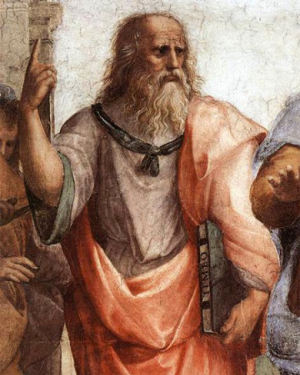Plato (428 - 348 BC) is the father of western Philosophy. For Haz, philosophy starts with Plato and ends with Hegel.[1] What both men share is an absolute courage of thought: the idea that nothing matters but philosophy. At the same time, both avoid the temptation (of all idealism) to establish some established form, some achieved totality (Baconian Idola, or Kantian hypostasis) in which the restlessness of thought could submerge itself, and come to rest. It is in this sense that these two are the philosophical-ideal forefathers of Communism, of the "real movement which sublates the present state of things."
French Communist Alain Badiou is famous for claiming Plato as the first Communist, and although they each have critiques of him, Slavoj Žižek and Reza Negarestani both agree with Badiou on this. Of this connection, Haz has said:
We as [Platonic] philosophers somehow resign ourselves to the openness of the fact that the truth we discover in heaven is the same truth being disclosed to us from earth. We make finally the connection between the universal truth of philosophy and the reality of Humanity. That was how Marx discovers the proletariat …remember what Marx called the proletariat: ‘the ingenious soil of the people’.[2]
Identity, Ambivalence[edit | edit source]
It is a mistake to identify the Socrates of with Plato with the historical Socrates, whom we know basically nothing about. It would also be a mistake to identify Plato with Socrates. Plato never speaks. Rather, his philosophy assembles itself in the dialogues as a dynamic between players. For this reason Plato’s Dialogues are defined by a profound ambivalence; and by introducing this to thought, he gives life to philosophy. This ambivalence is reflected in the myriad interpretations: to the Neoplatonists, a Christian fanatic; to the Tübingen school, an exponent of the demiurge. It is this ambivalence which makes Plato truly immortal, and deeply unsettling.
Periodization[edit | edit source]
Plato's work falls roughly into four periods.[3] In his early work, he tries to emulate Socrates. He employs the Socratic method of interrogation to undermine and annihilate contemporary dogma. Typical of this period is Euthyphro, a short dialogue in which Piety is shown to be a tautology: are acts holy because they are loved by the gods, or are they loved by the gods because they are holy? No satisfying answer here emerges - and this is typical of the early Plato - it is the same with Lysis, a dialogue on friendship which ends with the admission that "we have not as yet been able to discover what we mean by a friend."
In his middle period Plato attempts to go beyond Socrates, and begins to posit his own principle, the Good, as opposed to earlier work in which he remained almost entirely critical. This is the Plato of the Republic, with its two-world ontology, the doctrine of forms, and the Good. Reza Negarestani has described the Good, or Form of Forms, as a "principle of intelligibility," in the sense that without it no predication or intelligence would be possible. In a letter written toward the end of his life, he called this the most vulgar of his works. Theaetetus forms something of an intermediary phase, in which he begins to question the doctrine of forms as laid out in the Republic.
Finally, with the Philebus, Timaeus, the Sophist and the Laws we have the mature Plato. All the charm and playfulness is gone. In the last even Socrates himself disappears. Plato is toward the end of his life and has no time for detours down blind alleys of dialectic. He soberly critiques own doctrines, and steadily aims to complete his project of combining Eleatic being and Heraclitan flux in systematic theory of intellect. Already in the Philebus one can see that he has abandoned the earlier doctrine of forms, replacing them with something more akin to Categories in the Aristotelian or Kantian sense, no longer metaphysical objects but principles of intelligibility.
- ↑ https://youtu.be/pOy9LvGizag?t=1827
- ↑ https://infrared-transcripts.pages.dev/en/youtube/infrared/lgeuzbk_y3s/Timestamp: 2:46:21
- ↑ This section relies almost entirely on Reza Negarestani's lectures on Plato, which are available here: https://www.youtube.com/watch?v=UNPzvth5F5U&list=PL2NulH_zOHESDHy3gkdmC-UHu6mWAjQsD&pp=iAQB
